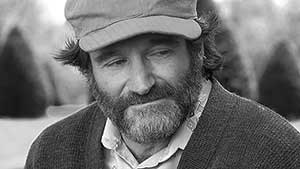The crew from Dear Cast and Crew writes one last letter to the great Robin Williams, sharing their thoughts and memories on everything from The Survivors to World’s Greatest Dad —and just about every film in between.

Dear Robin,
1991. You were already a star and a household name, but the world was only beginning to understand the range of your talents. Honestly, Jack Lemmon may be the only person who can challenge your place as the most versatile actor in Hollywood history.
Yet, as an 8-year-old, that's not why I found you so likeable in Hook. All I saw was a an adult who was able to become a completely new man by releasing his inner child. Looking back, I don't think you were acting at all. Neverland was your true home. Your whole career is the proof.
The next time I saw you was as the shape-shifting Genie in Aladdin. I remember my uncle telling me after that the filmmakers locked you in a sound booth and told you to go wild. I have no idea if that's true, and there's no need to verify it--I have no doubt that there's more of you in that animated performance than anything even Andy Serkis does. Even as a master imitator and comedic chameleon, that Robin Williams energy comes through in every animated cel. Electric, eccentric, and unstoppable.
You rounded out a perfect childhood trilogy for me with Mrs. Doubtfire. This was the point at which I began to appreciate your ability to create real empathy, even through caked-on make-up and with your breasts on fire. Through it all, I thought of you as a caring father who would do anything to be with the ones he loved. And I'll still think of you that way.
Sincerely,
Christopher

Dear Robin,
I'll admit that I was never fond of your manic brand of comedy. It was all about volume, all about building momentum. But your best dramatic work was the opposite of that. Rooted in stillness, in silence. The best moments were those that occurred between lines of dialogue, when you were reacting, or deliberating, or listening to someone else speak. The performances that resonated most with me weren't the ones that came from that self-conscious place, which, in its lunatic furor, sometimes seemed too desperate to please. Rather they were the ones that didn't feel at all like performances. The ones in which you seemed to be playing yourself.
There was no one better suited to play a fictionalized version of the quiet and compassionate neurologist Oliver Sacks. Awakenings is one of those films that Hollywood can't seem to make any more: an earnest adult drama that doesn't feel, even in its most sentimental moments, too affected, too manipulative. And your performance in that film was just as rare; the comic energy that had served you so well in the early part of your career was translated into Dr. Malcolm Sayer's anxious tics and eager intellectualism. Restrained isn't quite the right word. Repurposed is maybe a bit closer to the mark. No one could have guessed that the man who played Mork from Ork could pull of such a subtle moment of comedy like the one in which, rushing to a patient's bedside, you ask, "Where are my glasses?"--then touch your face to find that you're already wearing them.
But for me, the role that captured your best qualities as a performer was as Sean Maguire in Good Will Hunting. It's a film I like very much (whether subjectively or objectively, I'm not certain), and the scenes I like best are those simple conversations between you and Matt Damon. There's a sadness to that character. He's a widower. He's been left behind by his more successful peers. And yet he's the moral center of the film, the one character who hasn't compromised his integrity. True, too, of the actor who played him. I can't think of a performance more serene, more unselfish. The famous scene in which you keep repeating the line "It's not your fault," could have been the sort of Oscar-bait melodrama so often parodied for its naked desperation, but the way you let it play out - patient, steady, soft - was remarkable for its absence of desperation.
You'll be remembered for the funny voices and relentlessness wisecracking, but you were at your best when you were simply yourself.
Sincerely,
Jared Young

Dear Robin,
It seems like you've been a part of the pop cultural landscape forever. But I'm old enough to remember a time before you, which makes it even harder to think of a world without you. The next days, weeks, and months will be filled with people trying to make sense of why you did what you did. As far as I'm concerned, you don't owe us a thing. Make no mistake, I'm angry with you, but as someone who has suffered from depression, I get it. I just want to say thanks for making me laugh, for making me cry, and for making me think.
In that order:
You received your first Oscar nomination for Good Morning Vietnam, _a film that captured the zeitgeist of 60s-era nostalgia. It was Motown, Saigon, and _Laugh-In rolled together and repackaged for an MTV audience. Your portrayal of real-life Army deejay Adrian Cronauer was, by all accounts, grossly exaggerated. But it didn't matter, because audiences came to see you being you, in all your frenzied, tangential glory. What we didn't know was that you had finally found your internal fader, the knob that allowed you to turn down the lunacy and turn up the restraint. You delivered a hilarious and surprisingly thoughtful performance, and it proved to audiences that you could balance comedy and tragedy when you really wanted to.
Among my most beloved films is The Fisher King, an underrated oddity that combined the incomparable talents of three of my favourite artists; you, Terry Gilliam, and Jeff Bridges. Gilliam crafted a gritty, bittersweet story about a maudlin shock-jock's plummet from fame into drunken obscurity, and his quest to save the indigent man-child whose life he's ruined. Your bi-polar, Grail-seeking Parry steals the film with his manic melancholy. Through him, you were able to display a profound range only hinted at in your previous work.
Nearly two decades later you played the titular World's Greatest Dad, Lance Clayton, a schlubby teacher whose belligerent teenage son has accidentally asphyxiated while masturbating. It's not your best known role, but it's definitely your bravest. And it's one you disappear into. Written and directed by your friend Bobcat Goldthwaite, it's the cynical portrait of a society obsessed with death, fame and ego, and a man desperate for recognition. I debated even mentioning this pitch-black comedy, but it's a performance you should be proud of, one that all of your fans should see. After four decades of consistently remarkable work, I didn't think you could still surprise me, but you did.
Boy, did you ever.
With much gratitude,
Di

Dear Robin,
The movies that stick out for me when I think back to my childhood aren't always the ones I'd expect. Sure, there are the usual suspects: the touchstones that everyone remembers. But then there are those movies that have disappeared over the cultural event horizon, usually due to box office failure or critical indifference (or both). And yet they refuse to fade from my memory. Like your 1983 film The Survivors.
I don't know what possessed my parents to take me to see it. As a nine year-old, I was certainly too young to grasp the satire. And I didn't know enough to be excited by the prospect of you teaming up with Walter Matthau and his Bad New Bears director Michael Ritchie. Mainly, I remember expecting to laugh--and then being confused about why I didn't. I don't even think I really liked The Survivors all that much. And I haven't revisited it since that initial viewing.
Yet it remains lodged in my memory, and it's because of you.
To me, you were that crazy guy on TV who arrived on earth in an egg and talked in funny voices, the comedian who ran around late night talk show sets in a desperate (and always successful) attempt to garner the audience's approval. That's what I expected to see in The Survivors. Not the nuanced, complicated character you created in Donald Quinelle. Sure, there were laughs. But there was also pain and rage, and all of it worked together to create a character that felt completely human--maybe too human for a Mork-loving kid like me. And as we've all come to learn, a pain and rage that came genuinely from within you.
At the time, I don't think any of this registered; not much registered, really. But you put something in my head: movie stars didn't have to stick to the shtick that made them famous in the first place. Star personas were a tool that could use to help the audience, or turn its expectations upside down. Even if I didn't know at the time, my perceptions of acting--and filmmaking--had started to change. These were things, made by people, making choices about how they wanted us to react to them. It made me want to know more, to see more, to never accept the status quo as the only option.
And I'll always be thankful for the confusion you left me with as walked out of the theatre that afternoon.
Sincerely,
Casey

Dear Robin,
As a kid, I loved Mork and Mindy with such a white-hot intensity that I was willing to watch _Popeye _multiple times without understanding it at all. I even snuck in a few sessions of your stand-up, which was shocking to my young mind, full of references that I wouldn't understand until much later. I remember feeling, even at that young age, that this was a complicated person I didn't quite understand. Was there a real Robin Williams? I thought for sure it was the one I loved first. The others were just an act.
This is probably the experience for almost anyone who is a fan of your work. It ranged from light slapstick to aggressive manic comedy, to emotional drama, to brooding darkness. If you liked one, you were certain to be confused by the other three.
I feel that your dramatic work was much closer to who you really were as a person. The comedy and zaniness seemed to be require more effort. You seemed so eager to earn the approval and love that you wanted--but what often seemed like improv was really the result of having so much material in your head, which you could remix and redeliver at any given second. Comedians have often succeeded at dramatic roles, since the self-reflection, drive, and vulnerability required to be truly funny can drive powerful work. But your highs and lows in emotional tenor were so extreme that it was almost hard to accept.
But…Insomnia.
I had enjoyed your serious work before, but this role, though small, was surprising and singular. You brought out a passionate sadness that was able to stop a full-speed Pacino is his tracks. And drown him. You were bottomless in that film. This was the side that countered the cross-dressing nannies. This was the shattering core that powered all the other personas. The movie hit me like a punch to the gut, and the news of your passing hit me the same way, too .
Thank you and godspeed,
Cory
Sincerely,

Dear Cast & Crew







